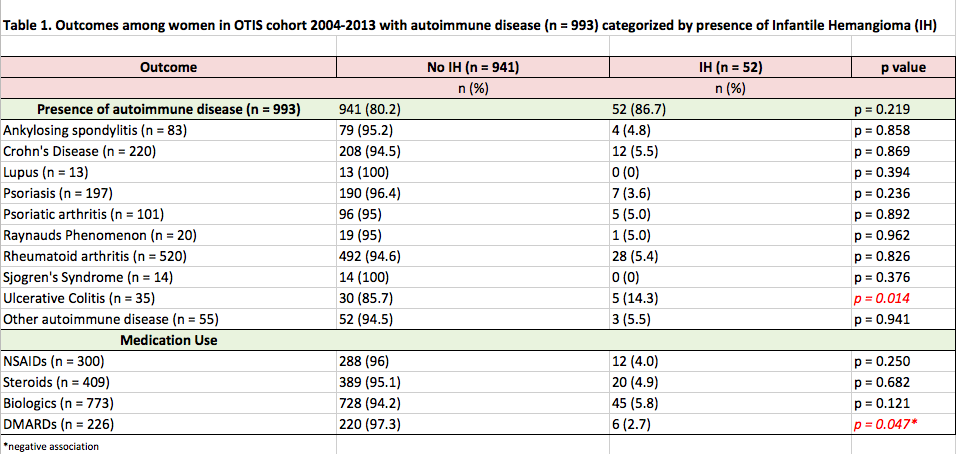Session Information
Session Type: ACR Poster Session C
Session Time: 9:00AM-11:00AM
Background/Purpose: Infantile Hemangiomas (IH) are the most common benign vascular tumor in infants, estimated to occur in 4-5% of the general population. Many of the known risk factors for IH (low birth weight, female infant, white race, preterm birth, multiple gestations) are also seen with increased frequency in pregnancies with autoimmune disease. The purpose of this study was to compare the incidence of IH in infants born to women with autoimmune diseases to the incidence in infants born to healthy comparison women, to determine if specific diseases/treatments were associated with risk for IH, and to describe characteristics of infants with more severe IH.
Methods: Data were obtained from the Organization of Teratology Information Specialists (OTIS) Autoimmune Disease in Pregnancy Project, a prospective cohort study of pregnancy outcomes among women in the U.S. and Canada. Pregnant women who were recruited into the study from 2004 to 2013, enrolled before 19 weeks gestation, and delivered at least one live born infant were eligible for analysis. To increase the reliability and validity of the diagnosis of IH, the sample was further restricted to infants that had received a blinded dysmorphological examination for major and minor defects.
Results: 1233 infants born to 1191 women met criteria for inclusion. The overall incidence of IH was 60/1233 or 4.9%. Of these, 52/993 (5.2%) infants with IH were born to mothers with an autoimmune disease, and 8/240 (3.3%) infants with IH were born to mothers without autoimmune disease (p = 0.219). There was a significant association between the presence of ulcerative colitis in the mother and IH in the child (p = 0.014) compared with other autoimmune diseases [See Table 1]. In multivariate analysis, this association remained. Of the 60 infants with IH, 5 were classified as at least 3x3cm; all 5 of these infants were born to mothers in the autoimmune disease group who were taking a biologic medication during pregnancy.
Conclusion: The incidence of IH in this cohort was similar to the estimated incidence in the general population. While there was no significant difference between the overall incidence of IH in children born to women with autoimmune disease compared to healthy controls, the fact that all 5 of the largest and thus more clinically significant cases of IH occurred entirely within the autoimmune disease cohort may have important implications. These results add to the limited knowledge available regarding fetal outcomes and presence of malformations in this population.
To cite this abstract in AMA style:
Forbess Smith C, Jones KL, Johnson DL, Chambers CD. Infantile Hemangiomas in Infants Born to Women with Autoimmune Diseases [abstract]. Arthritis Rheumatol. 2016; 68 (suppl 10). https://acrabstracts.org/abstract/infantile-hemangiomas-in-infants-born-to-women-with-autoimmune-diseases/. Accessed .« Back to 2016 ACR/ARHP Annual Meeting
ACR Meeting Abstracts - https://acrabstracts.org/abstract/infantile-hemangiomas-in-infants-born-to-women-with-autoimmune-diseases/

